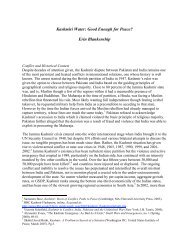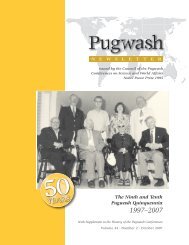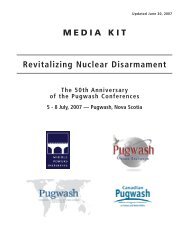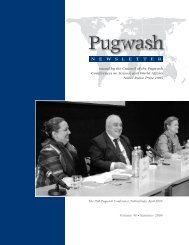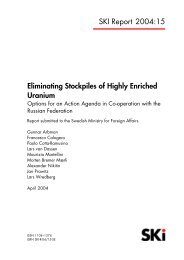Bas Pease - Pugwash Conferences on Science and World Affairs
Bas Pease - Pugwash Conferences on Science and World Affairs
Bas Pease - Pugwash Conferences on Science and World Affairs
Create successful ePaper yourself
Turn your PDF publications into a flip-book with our unique Google optimized e-Paper software.
In 1970, he opened a dialogue with Euratom (the European Atomic Energy Community)<br />
<strong>on</strong> British participati<strong>on</strong> in its programme, though Britain was not yet a member of the<br />
European Community. When Britain did join, in 1973, Culham became involved in the<br />
Joint European Torus working group (Jet), <strong>and</strong> <str<strong>on</strong>g>Pease</str<strong>on</strong>g> pushed for the tokamak experiment<br />
to have a more ambitious design objective, to achieve a full-scale dem<strong>on</strong>strati<strong>on</strong> of<br />
therm<strong>on</strong>uclear fusi<strong>on</strong>. He was subsequently involved in a l<strong>on</strong>g political wrangle over the<br />
locati<strong>on</strong> of Jet, <strong>and</strong> deserves much of the credit for the eventual decisi<strong>on</strong> of the EU<br />
council of ministers in 1977 that it should be at Culham.<br />
While Jet remains the world’s leading fusi<strong>on</strong> research apparatus, <str<strong>on</strong>g>Pease</str<strong>on</strong>g> was already<br />
pushing for its successor, Iter (internati<strong>on</strong>al therm<strong>on</strong>uclear experimental reactor), itself<br />
now quagmired in geopolitical debate. He retired in 1988.<br />
His many h<strong>on</strong>ours included electi<strong>on</strong> to the Royal Society in 1977 (he became a council<br />
member <strong>and</strong> vice-president), <strong>and</strong> the award of the Glazebrook medal, the premier award<br />
in Britain for physics, in 1989. However, with his excepti<strong>on</strong>al combinati<strong>on</strong> of l<strong>on</strong>g-range<br />
visi<strong>on</strong> <strong>and</strong> tactical skill, his outst<strong>and</strong>ing c<strong>on</strong>tributi<strong>on</strong> to the British fusi<strong>on</strong> programme was<br />
as a manager of what had become “big science”. In the nuclear debate, <str<strong>on</strong>g>Bas</str<strong>on</strong>g> was a<br />
crossbencher – a str<strong>on</strong>g advocate for the use of nuclear power, but equally opposed to<br />
nuclear weap<strong>on</strong>s. He was a prominent member of the British <str<strong>on</strong>g>Pugwash</str<strong>on</strong>g> Group <strong>and</strong> a<br />
member of its internati<strong>on</strong>al council when the Nobel Peace Prize was awarded jointly to it<br />
<strong>and</strong> its then president, Joseph Rotblat, in 1995. He c<strong>on</strong>tributed to a number of <str<strong>on</strong>g>Pugwash</str<strong>on</strong>g><br />
publicati<strong>on</strong>s, including <strong>on</strong>e giving the case against the replacement of Trident.<br />
<str<strong>on</strong>g>Bas</str<strong>on</strong>g> was very much a family man, His first wife, Susan, had five children, <strong>and</strong> he used to<br />
take the whole family, including gr<strong>and</strong>children <strong>on</strong> holiday – though was sometimes heard<br />
to mutter that “a round of ice cream would set you back.” Accomplished <strong>on</strong> both the<br />
clarinet <strong>and</strong> piano, he played in the Newbury amateur symph<strong>on</strong>y orchestra. He also<br />
loved walking <strong>and</strong> entertaining his friends in his Berkshire home.<br />
After Susan’s death in 1996, he married Jean, whom he had known at Culham. She died<br />
in 2000, <strong>and</strong> he married Eleanor, who survives him al<strong>on</strong>g with his three s<strong>on</strong>s <strong>and</strong> two<br />
daughters.<br />
Robert Hinde <strong>and</strong><br />
Joseph Rotbat<br />
Rendel Sebastian <str<strong>on</strong>g>Pease</str<strong>on</strong>g>, physicist<br />
Born 2 November 1922; died 17 October 2004.



